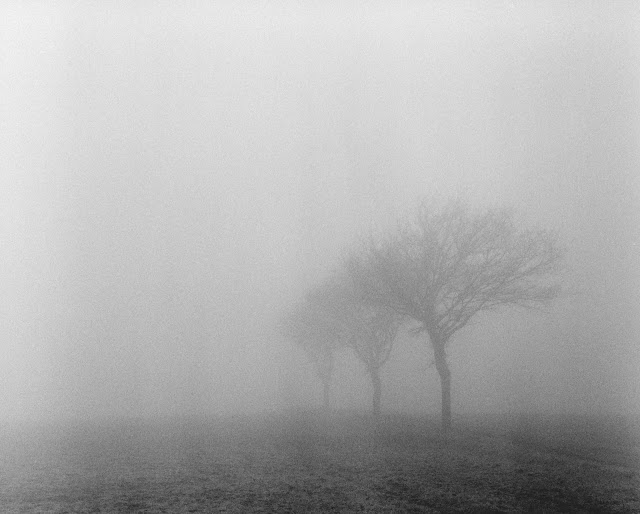Mathematical Trees Study
Since my series of posts on the Mathematical Trees prints I had given some thought to the idea that there might be other compositions or viewpoints that might give up different interpretations of the image. I was stymied by the idea that what worked was the snow on the ground in terms of the making of a minimal image. Failing snow in the weather forecast I filed the idea away in my head.
This morning I was up very early relieving myself and peeked out the window as there was fairly bright light with the full moon. There was a thick fog apparent so I set my alarm for a couple of hours hence. As I fell asleep I laid my plans to make a quick return visit.
The alarm sounded and I quickly got dressed and hurriedly gathered my gear. A little too hurriedly it turns out as I left my tripod plate on my Fuji 690. The fog was thick when I arrived and perhaps a little too much. It was cold about -3 degrees C. I brought one roll of Ilford FP4+ as I wanted to be back home for breakfast. I had my Mamiya 645 Pro so I could try different lenses as I tried different compositions. I used my 80mm and 150mm with and without my 2x teleconverter.
I first encountered the copse from the original photo but from the other end and had my first inkling about my big lesson from the day. Wide angle lenses make way more sense in a fog. I put on my 80mm lens then proceeded to move back until I could get the entire bulk of the copse into the viewfinder. Alas I had to step so far back it was barely visible through the density of fog the lens put between me and the subject.
 |
| Copse (can you see it?) 80mm f1.9 |
I did manage nice photo closer to the copse in portrait mode. By now I realized I had forgotten the tripod plate so had to use my knit cap on the top of the tripod mount as a platform for the camera. The images are quite soft from the fog so it seems to mostly have worked. I metered the sky and generally shot one or two stops overexposed. In many cases I took two exposures this way as I had the luxury of 15 exposures on a roll.
 |
| Copse Edge 80mm f1.9 |
I walked past the copse and found what I first thought were my trees but they weren’t quite how I remembered them. I tried a few different angles. I walked further and found the real trees I was looking for so this explained why the first ones didn’t seem right. The visibility was very poor so it was hard to get my bearings from last time.
These first two were taken with the 150mm lens. Because I had to stand far away lots gets lost in the fog. This is good or bad depending on how one views the image.
 |
| False Trees Study #1 150mm f4 |
 |
| False Trees Study #2 150mm f4 |
The 80mm below let me stand closer and the foreground objects are consequently darker.
 |
| False Trees Study #3 80mm f1.9 |
Looking now it all makes sense the three trees are arranged down a slight slope and the photo I took from the bottom looking up which is why the trees are silhouetted against the sky so nicely. I had debated in my head if I could find other arrangements. Because I hadn’t understood this I couldn’t see how this arrangement could work from other angles.
This first image is a similar angle from the original except with a 150mm lens on a 6cm wide negative while the original was a 65mm lens on a 9cm wide negative. For the original I had to stand very close to the first tree.
 |
| Mathematical Trees Study #1 150mm f4 |
 |
| Mathematical Trees Study #2 150mm f4 |
 |
| Mathematical Trees Study #3 300mm (150mm 2x Teleconverter) |
 |
| Origin Trees |
Comments